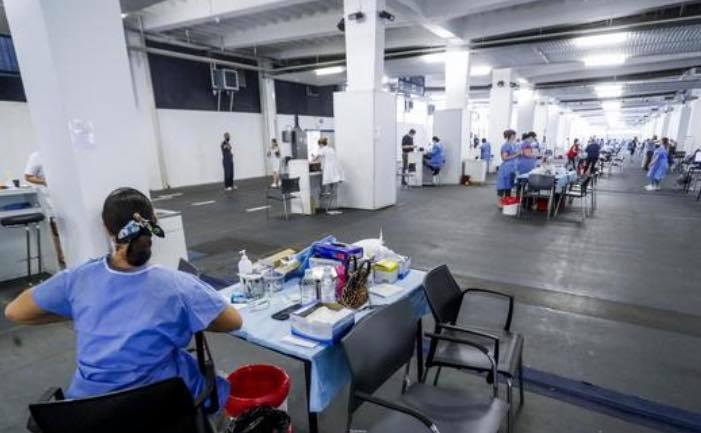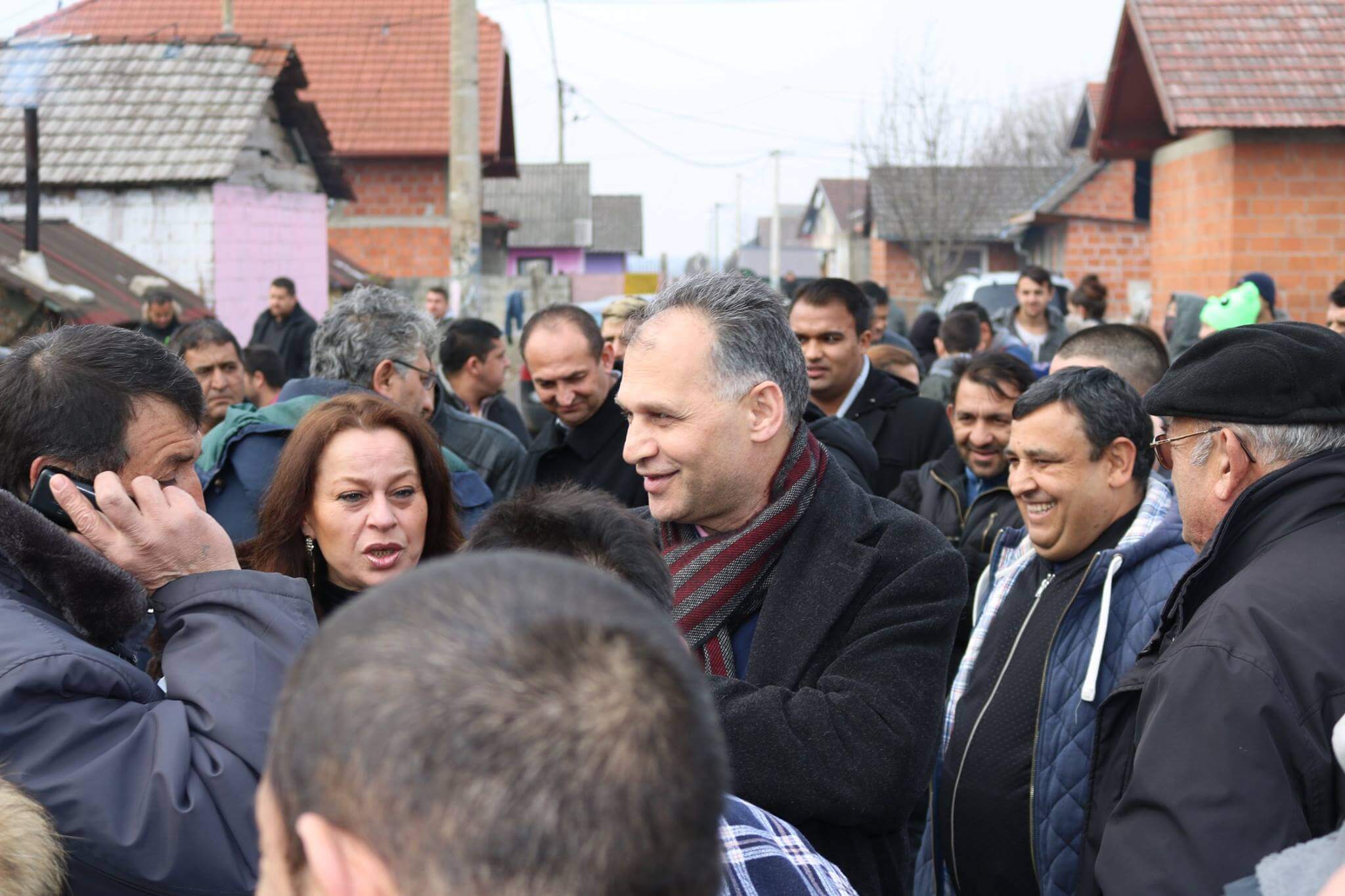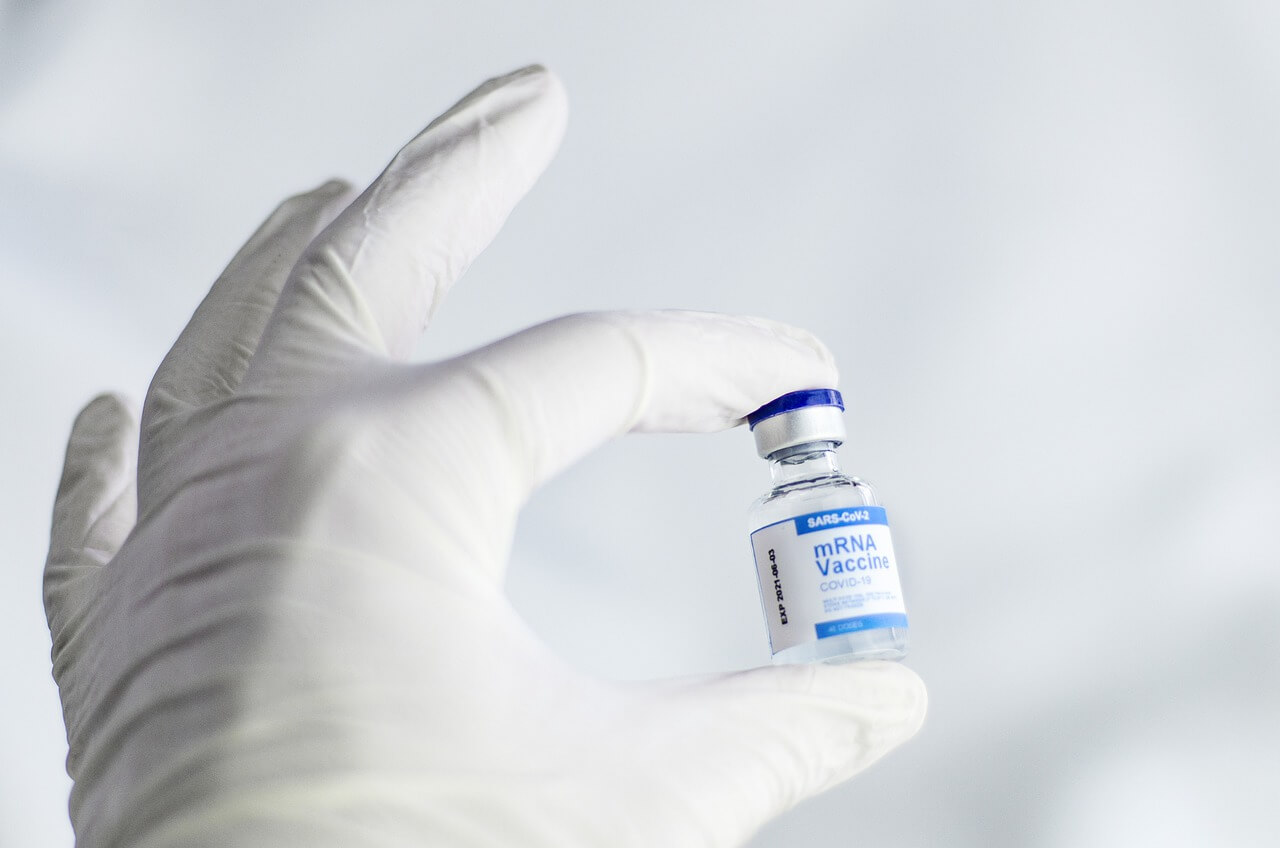Croatian Public Health Institute on Vaccinating Roma People
July 23, 2021 - The response by the Croatian Institute of Public Health on vaccinating Roma people arrived few hours after TCN published the first article on the subject. TCN, true to its words, will now publish the response as promised to our readers.
A recent TCN report about vaccinating Roma people people saw the Croatian Institute of Public Health (HZJZ) send the answers that didn't make it out before the publishing of the article. They apologised, stating that it all might have come down to a mistake in communication, suggesting that their reply might have been originally sent to the wrong address (after sending, forwarding, and lots of e-mail addresses involved, one can understand that the answers could have been sent to the wrong email).
Either way, it's fantastic to receive some new info on the matter.
A quick reminder, Veljko Kajtazi, a member of the Croatian parliament, elected as a representative of the Roma community, told TCN that official research of the percentage of vaccinated Roma people hasn't been conducted, but added that he frequently goes ''to out into the field'' and can see that the situation isn't with vaccinating Roma people isn't good.
''If 45% of the Croatian population is vaccinated, I can say that Roma people are a very small percentage of that number,'' commented Kajtazi. He also recognised fake news as the cause of lowered interest in the vaccine.
''Last year, 80% of Roma people wanted to take the vaccine, but today, they're scared and believe in various conspiracy theories. People aren't informed, and social media spreads so much disinformation,'' stated Kajtazi.
 © Cijepljenje / Vakcinacija
© Cijepljenje / Vakcinacija
Ethnicity is not a criterion for vaccination
HZJZ responded that they also hadn't conducted any research about attitudes towards COVID-19 vaccines among the country's Roma people. They also haven't come up with any statistics for the percentage of vaccinated Roma people.
''During the vaccination process, no differences are made in regards to ethnicity as the vaccination plan doesn't see ethnicity as a criterion for who can take the vaccine and who can't. This is the same with Roma people and for any other ethnic minority,'' explained HZJZ. They added how they asked each of the county branches of the Public health Institute about vaccinating Roma people and the field information confirmed that vaccination is being carried out in accordance with the current vaccination plan.
''So far, there has been no analysis of the number of vaccinated people based on ethnicity at the state level, and local institutes don't keep a record of vaccinated people based on their ethnicity. This doesn't exclude the possibility of retrograde analysis in accordance with available data,'' pointed out HZJZ.
Regarding the isolation of Roma people, HZJZ said that local institutions arranged open points for the vaccination for all Croatian citizens, and they suggest that they had arrived at this point due to the partially inadequate organisation and a lack of financial conditions, not to mention a lack of human resources for vaccination in Roma villages.
However, the trouble of the isolation of Roma villages does seem to be something HZJZ recognises as a challenge in vaccine availability.
''With the goal of accomplishing a higher vaccination rate among the Roma community, we think an optimal solution would be to organise transport for the Roma community to the open vaccination points. But, that isn't in the domain of HZJZ, so we'd like to invite institutions that can help in organising transport to contact their nearest Institute for Public Health. Simply put, these institutes will organise vaccination wherever necessary, but to organise for citizens to come to the vaccination location by some special conditions, the organisational assistance of other contributors is needed,'' they concluded from HZJZ.
With Kajtazi previously stating for TCN that he is regularly in contact with the authorities when it comes to ensuring vaccines, as well as for real scientific information on their safety and efficiency, the organisational issues of transport to the vaccination points could be resolved.

Roma Representative in Croatian Parliament, Veljko Kajtazi, visiting Roma people in Varaždin © Savez Roma u RH "KALI SARA"
With increasing numbers of new cases of infection being noted, the situation may not be as dramatic for the moment but could escalate quickly if Croats fail to recognise the importance of vaccination, not just because of the risk of ending the tourist season early but also due to the potential of another heavy blow to the Croatian healthcare system.
At the time of writing this article, the latest report noted 179 new cases, one death, and 98 recoveries. Additionally, health officials had administered nearly three million vaccine doses. Thus, 1.604 million people have received at least one dose of vaccine against COVID-19, and 1,401,029 have fully been vaccinated (1,360,822 have been double-jabbed plus 40,207 who have received the single-dose Jannsen vaccine), and this makes up 41.614% of the Croatian adult population.
Learn more about travelling to Croatia during the COVID-19 pandemic on our TC page.
For more about COVID-19 in Croatia, follow TCN's dedicated page.
Roma People COVID-19 Vaccination in Croatia: Will Crushed by Disinformation
July 22, 2021 - With the overall struggle to get Croatians to take the coronavirus vaccine, it is often overlooked regarding Roma people COVID-19 vaccination in Croatia.
Despite coronavirus infections being low at the moment, the situation is tense. On July 5, as TCN reported, only 35% of the Croatian population was vaccinated as the Delta strain spreads globally and in the country.
"Unfortunately, we aren't satisfied with the percentage of vaccinated people we hoped to have. We all wanted to vaccinate more than 50 percent of the total Croatian population during June, but sadly our numbers in that regard are much lower. Only about 35 percent of the total Croatian population has been vaccinated, which isn't enough for them to be calm and to be able to live according to the old normal,'' said epidemiologist Dijana Mayer back then. This was punished with the Croatian coast no longer being in the green, and without bigger vaccination interest, things can turn red. As TCN wrote, there are 5-6 Positive Cases at Split Airport every day, and new measures are introduced to British tourists as the Delta strain is booming there (but in a less fatal manner because of vaccines). Stricter measures, in general, can be excepted by the end of the month in Croatia too.
Fortunately, things got better in July. As reported on Wednesday, „Croatia administered nearly three million vaccine doses. Thus, 1.6 million people have received at least one dose of vaccines against COVID-19, and 1,388,674 have fully been vaccinated (1,349,652 have been double-jabbed plus 39,022 who have received a single-dose Jannsen vaccine), and this makes up 41.24% of the adult population“.
But, disinformation about COVID-19 vaccines is vividly spread (just as disinformation about COVID-19), leaving Croatian fact-checking site Faktograf knee-deep in debunking work. Many Croatians sadly believe the fake news of the anti-vaxxers, and the situation culminated to the point where the Croatian officials (as officials in many other EU countries that also struggle with anti-vax propaganda) seriously discuss obligatory vaccination. Will it happen? Some politicians are up for it, others no, but overall, the situation is uncertain as the fourth infection wave approaches, and the season could potentially be in jeopardy in mid-August, as 24 Sata writes.

COVID-19 vaccine © Pixabay
In summary, there are currently more vaccines in Croatia than there are people interested in. It's hard to believe how things progressed from the start of the year when we witnessed a delay in vaccine shipments, outrage by the public when people such as Zagreb University Rector Damir Boras received the vaccine ahead of time and schedule. From the malfunctioning Cijepi se (Vaccinate yourself) website where you had to register for an appointment (which took forever to get) to a family doctor being able to sign you up, all the way to be able to take a shot without an appointment today, vaccines truly became accessible for everyone. There were even buses bringing vaccines and performing vaccinations in remote villages. So vaccines are for everyone to take, but is it really so?
Nothing in the world is perfect, and neither is Croatia. From time to time, we can see that some groups in Croatian society do get discriminated against or suffer negative stereotypes. For example, with significant progress in accepting the LGBTQ community, sadly homophobic attacks still happen. The tensions with the Serbian minority vary from the day-to-day political agenda, but it is safe to say no one has it worse than the Roma people in Croatia.
As TCN previously wrote, following the 2020 report by Human Rights House in Zagreb, Roma people in Croatia are still facing many obstacles in achieving their rights, which include employment, access to services, and adequate living standards, and there is still segregation in the education system too. Either perceived as thieves, criminals, beggars or completely ignored in Croatia, the question of how many Roma people in Croatia received the vaccine and how many Roma people want the vaccine in the first place, can't be left aside, as it shows how much the vaccine rollout truly is fair for every citizen in the country.
Disinformation crippled 80% of those willing to get the vaccine
Veljko Kajtazi, a member of the Croatian parliament, elected as a representative of the Roma community, says that official research of percentage of vaccinated Roma people hasn't been conducted, but he frequently goes „to the field“, and sees that the situation isn't good.
„If 45% of the Croatian population is vaccinated, I can say that Roma people are a very small percentage of that number“, commented Kajtazi, then on a relevant number of vaccinated people.
He supports the talk of obligatory vaccines and finds disinformation and fake news regarding vaccines to be the cause of low interest.
 Veljko Kajtazi, screenshot / Hrvatska radiotelevizija
Veljko Kajtazi, screenshot / Hrvatska radiotelevizija
„Roma people have a very social culture, love gatherings, and live in big families. When the pandemic started, I cooperated with authorities in ensuring that social distancing measures are respected in Roma settlements and that we educate people on the dangers of coronavirus“, recalled Kajtazi.
While Roma people can be found living anywhere, the majority is often ghettoized. An example is in Zagreb, where the Kozari Bok neighborhood on the east side of the city is famous for its big Roma population. When looking outside of the capital city, there are many Roma villages and settlements which count more people than other Croatian villages.
One such place is Piškorovec in Međimurje, which the Lupiga news site referred to as „the biggest Croatian ghetto“. Their article detailed both living in Piškorovec and tensions with the nearby town of Čakovec underlining incidents and division between Roma and Croatians (as Roma People are often perceived as thieves or beggars).
„Last year 80% of Roma people wanted to take the vaccine, but today, they are scared and believe various conspiracy theories. People are not informed, and social networks spread so much disinformation“, Kajtazi pictured how wishing for a vaccine turned sideways.
In the end, he added that he is regularly in contact with the government and institutions to provide information on vaccines to the community. Katja also hopes the vaccine buses will come to Roma villages too.
Questions for HZJZ
The lack of information, geographical isolation, and the overall achievement of social rights (such as health insurance) like other Croatian citizens that the Human Rights House in Zagreb expressed in their report left a lot of open questions regarding Roma people vaccination. Particularly, are there any statistics on how many people vaccinated that the health officials might have, what is the mood towards vaccines in Roma communities in their view, and can buses come to isolated areas to vaccinate Roma people? The inquiry was sent to the Health Ministry and to the Croatian Public Health Institute (HZJZ). Health Ministry very quickly forwarded the inquiry to the Croatian Public Health Institute (HZJZ) as these questions are part of their domain. The health ministry even forwarded the questions directly to the HZJZ headmaster Krunoslav Capak himself and other close associates on e-mail addresses not visible on the HZJZ website. But, HZJZ hasn't responded yet. Whether I tried to remind them and ask when can they answer via e-mail or phone calls, none left a response (although a phone call with HZJZ PR service confirmed there are experts in HZJZ that deal with the health of vulnerable social groups, which includes Roma People).
When the answer that can be expected for the moment remains unknown, but TCN will publish HZJZ's response when we receive it.
In the meantime, as we can see, despite vaccine skepticism being strong, there is nevertheless a slow but steady daily rise of vaccinated people in Croatia.
Let's hope for the sake of public health that disinformation and fake news that turn people away from the vaccines will lower its influence on all the cultural groups and identities you can find in Croatia.
Editor's note: HZJZ response
Learn more about travelling to Croatia during the COVID-19 pandemic on our TC page.
For more about COVID-19 in Croatia, follow TCN's dedicated page.
Croatia Registers 155 New COVID Cases, 2 Deaths
ZAGREB, 14 July, 2021 - In the past 24 hours, there have been 155 new cases of coronavirus in Croatia and two people have died, the national COVID response team said on Wednesday.
Currently, there are 595 active cases in the country, including 111 hospitalised patients of whom 8 are on ventilators.
Since the outbreak of the pandemic in Croatia on 25 February 2020, there have been 361,079 people infected with the virus, of whom 8,233 have died and 352,251 have recovered, including 54 in the past 24 hours.
Currently, there are 3,939 people in self-isolation.
A total of 2,201,991 people have been tested to date, with 3,965 tests conducted in the past 24 hours.
As of 13 July, a total of 2,848,709 doses of vaccines have been administered and 38.5% of the population has been inoculated or 46.3% of adults.
A total of 1,562,081 people have received at least one dose and 1,317,827 have received both shots.
For more about COVID-19 in Croatia, follow TCN's dedicated page.
Croatia Logs 83 New Coronavirus Cases, 2 Deaths
ZAGREB, 13 July, 2021 - In the past 24 hours, 83 coronavirus cases and two deaths have been registered in Croatia, the national COVID-19 crisis management team said on Tuesday.
There are 496 active cases, including 106 hospitalised patients, nine of whom are on ventilators, while 3,969 persons are self-isolating.
Croatia has registered 360,924 coronavirus cases to date, 8,231 COVID deaths and 352,197 persons who have recovered from the disease, including 96 in the past 24 hours.
To date, 2,198,026 persons have been tested for the virus, including 4,577 in the past 24 hours.
Also, 2,833,080 vaccines have been administered, with 38.4% of the total and 46.3% of the adult population immunised - 1,557,706 persons have received at least one dose, including 1,275,374 that have received both and 30,131 that have received the Janssen vaccine, which requires only one dose.
For more about COVID-19 in Croatia, follow TCN's dedicated page.
Croatia Registers 141 New Coronavirus Cases, 3 Deaths in Past 24 Hours
ZAGREB, 7 July, 2021 - In the past 24 hours, Croatia has registered 141 new cases of coronavirus, while three people have died as a consequence of the infection, the national COVID response team reported on Wednesday.
Currently, there are 596 active cases in the country, including 120 hospitalised patients, 6 of whom are on ventilators, and 3,673 people are in self-isolation.
A total of 2,176,865 tests have been conducted today, including 4,982 in the past 24 hours.
As of 6 July, 2,714,126 doses of vaccines have been administered, with 1,518,820 people having received at least one dose and 1,195,306 having received both shots.
Since 25 February 2020, when the first case of the contagion was detected in Croatia, there have been 360,483 positive cases of coronavirus, 8,224 people have died and 351,663 have recovered from the infection, including 70 in the last 24 hours.
For more about COVID-19 in Croatia, follow TCN's dedicated page.
Croatia's Coronavirus Update: 96 New Cases, Two Deaths, 65 Recoveries
ZAGREB, 6 July, 2021 - In the last 24 hours, of 5,103 tests performed for coronavirus in Croatia, 1.9%, that is 96, have turned out to be positive, the national COVID-19 crisis management team stated on Tuesday.
Currently, there are 528 active cases, including 132 hospitalised patients, of whom 10 are placed on ventilators.
In the last 24 hours, the COVID-related death toll has risen by two to 8,221.
Since the first registered case of the infection with this novel virus in Croatia on 25 February 2020, as many as 2,171,883 tests have been performed showing that 360,342 people have contracted the virus. Of them, 351,593 have recovered so far, including 65 recoveries in the last 24 hours.
The Croatian Public Health Institute (HZJZ) reported on Tuesday that 37.3% of the total population or 45% of the adult population had been vaccinated to date.
A total of 2,687,515 doses of COVID-19 vaccines have been administered to date.
For more about COVID-19 in Croatia, follow TCN's dedicated page.
Josip Aladrovic on Government Aid: Time to Separate Responsible from Irresponsible
July the 4th, 2021 - Labour Minister Josip Aladrovic has stated that it is time to separate those who are responsible and those who aren't when it comes to handing out government economic support to businesses, echoing comments about the link between being vaccinated and receiving government support made by the Prime Minister recently.
As Poslovni Dnevnik writes, the announced possible denial of job preservation/economic aid to companies where workers haven't been vaccinated has provoked many reactions, Labour Minister Josip Aladrovic was among those who offered their view on it.
''As far as harmonisation with the law is concerned, we haven't had any problems with harmonising everything from epidemiological measures to economic measures with the law. Everything was done in full accordance with the law. I'm sure that in the dialogue with the unions and employers, we'll find some good arguments in this case as well, and a quality and legal solution,'' Josip Aladrovic said for RTL.
''We have several models that we're going to present to unions and employers. What's certain is that we have all borne the burden of this crisis. Therefore, everyone living in the Republic of Croatia, all taxpayers financed this crisis with 34 billion kuna. Now is the time to separate those who are responsible from those who are irresponsible, to encourage accountability through vaccination and a greater level of integration of economic and epidemiological measures. And epidemiological measures now mean, in translation, vaccination,'' said Aladrovic.
''We need to be aware that we're in a health and economic crisis. To overcome this we need to raise the level of vaccination so that the tourist season isn't jeopardised at this time, and the economy as a whole and beyond can remain stable. We need to integrate the vaccination process with our economic measures,'' he said.
"This is an affirmative way, not a way to penalise those who don't want to get vaccinated, but we'll arrange our economic measures so that they help those most responsible,'' the minister said.
Does this mean that those who will have one or two unvaccinated people in their company won't be able to count on measures at all, or will that only be the case for those unvaccinated employees?
''It’s too early to say what the model will look like. We'll present it to employers and unions as equal partners in this crisis first, and then we'll know what its final appearance will look like, which will certainly be legal and constitutional, and which will affirmatively promote vaccination in order to minimise damage to the economy,'' he said.
''Employees of my ministry are certainly not all vaccinated, about 50 percent of them are if I'm not mistaken according to the latest estimates, which is slightly more than the average of the Republic of Croatia. But we're affirmative towards all state and public services and we'll also have to find a way for public and state services to function in the future and make a very clear distinction between the rights and obligations of those who are vaccinated and those who aren't,'' assured Josip Aladrovic.
''We will award economic aid to those who are most responsible in society. So, it's affirmative, that those who are most responsible can more easily cope with the economic crisis, that is, the business difficulties they face. As for penalisation, so far we haven't prescribed the obligation to get vaccinated nor have we penalised anyone. We now have a lot of critics on these measures. However, we talked a lot in this study about the measures when they were introduced, and we had an equal number of critics then. Now we have 56,000 more employees than last year, 4,000 more than in 2019, which was the strongest economic year since 2008,'' he added.
If the Government has failed to motivate all public and public sector employees, how do you expect any of the private employers to succeed in motivating their people?
''I expect the motivation to be the same for everyone. Today, we have a million and a half vaccinated citizens, a million and a half taxpayers who have taken joint responsibility for overcoming the pandemic, the economic crisis and the public health crisis. We must make sure other people follow the same path,'' he said.
''So far we're at the level of 11.7 billion kuna, with contributions that amount stands at almost 17 billion kuna. We covered 700,000 people and 120,000 employers. As the weather improves, the pressure on the measures decreases. But we must point out that for April and May, the projected cost is 400 million kuna. Intensive support to certain sectors is still needed. But we have to allocate these funds in a much better way, we have to allocate them to those who need them the most, we aren't running away from that,'' Josip Aladrovic concluded.
For more, follow our politics section.


